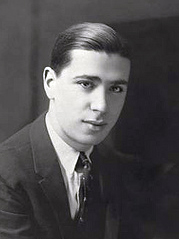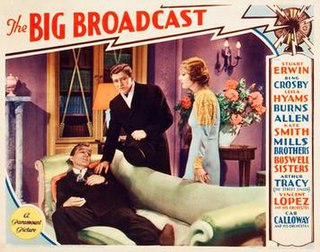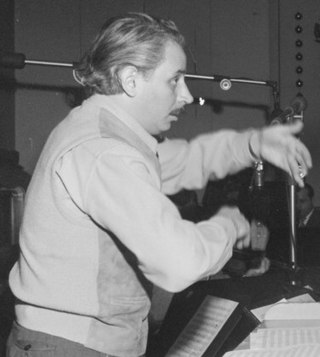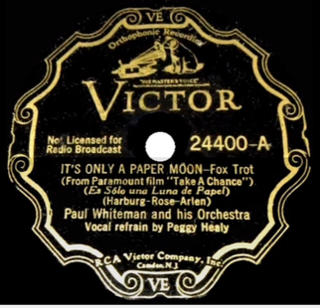Related Research Articles

Harry Lillis "Bing" Crosby Jr. was an American singer, actor, television producer, television and radio personality and businessman. The first multimedia star, he was one of the most popular and influential musical artists of the 20th century worldwide. He was a leader in record sales, network radio ratings, and motion picture grosses from 1926 to 1977. He was one of the first global cultural icons. He made over 70 feature films and recorded more than 1,600 songs.

John Francis Burke was an American lyricist, successful and prolific between the 1920s and 1950s. His work is considered part of the Great American Songbook.

Sam Coslow was an American songwriter, singer, film producer, publisher and market analyst. Coslow was born in New York City. He began writing songs as a teenager. He contributed songs to Broadway revues, formed the music publishing company Spier and Coslow with Larry Spier and made a number of recordings as a performer.

The Big Broadcast is a 1932 American pre-Code musical comedy film directed by Frank Tuttle and starring Bing Crosby, Stuart Erwin, and Leila Hyams. Based on the play Wild Waves by William Ford Manley, the film is about a radio-singer who becomes a popular hit with audiences, but takes a disrespectful approach to his career. His repeated latenesses leads to the bankruptcy of the radio station, but his career is saved by a new friend who buys the station and gives him his job back.

Leonard George Hayton was an American musician, composer, conductor and arranger. Hayton's trademark was a captain's hat, which he always wore at a rakish angle.

"It's Only a Paper Moon" is a popular song published in 1933 with music by Harold Arlen and lyrics by Yip Harburg and Billy Rose.
"But Not for Me" is a popular song originally written by George Gershwin and Ira Gershwin for the musical Girl Crazy (1930).
"I've Got The World on a String" is a 1932 popular jazz song composed by Harold Arlen, with lyrics written by Ted Koehler. It was written for the twenty-first edition of the Cotton Club series which opened on October 23, 1932, the first of the Cotton Club Parades.
"Love Is Just Around the Corner" is a popular song with music by Lewis E. Gensler and lyrics by Leo Robin, published in 1934. It was introduced in the 1934 Bing Crosby film Here is My Heart and was also included in the 1935 film Millions in the Air.
"'S Wonderful" is a 1927 popular song composed by George Gershwin, with lyrics written by Ira Gershwin. It was introduced in the Broadway musical Funny Face (1927) by Adele Astaire and Allen Kearns.
"But Beautiful" is a popular song with music written by Jimmy Van Heusen, the lyrics by Johnny Burke. The song was published in 1947.

"Crazy Rhythm" is a thirty-two-bar swing show tune written in 1928 by Irving Caesar with music by Joseph Meyer and Roger Wolfe Kahn for the Broadway musical Here's Howe.

The Brooklyn Paramount Theater is a former movie palace at 1 University Plaza at the intersection of Flatbush and DeKalb Avenues in downtown Brooklyn, New York. Opened in 1928, the building has been owned by Long Island University (LIU) since 1954. Converted for use by LIU as classroom space and a gymnasium, the building retains much of the theater's original decorative detail. Until recently the venue operated as a 1200-seat multi-purpose arena, formerly home to the Brooklyn Kings basketball team. As of 2017 it was in the planning stages of a renovation to reopen the theater as a performing arts venue in 2019.
"I've Found a New Baby", also known as "I Found a New Baby", is a popular song written by Jack Palmer and Spencer Williams. It was introduced by Clarence Williams' Blue Five in 1926 and has since been recorded by many artists, making it a popular jazz standard. Popular versions in 1926 were by Ted Lewis and by Ethel Waters.
"I Guess I'll Have to Change My Plan" is a popular song published in 1929, with music by Arthur Schwartz and lyrics by Howard Dietz.

"I Don't Stand a Ghost of a Chance With You" is a 1932 song recorded by Bing Crosby with Orchestral Accompaniment. The music was composed by Victor Young, with lyrics written by Ned Washington and Bing Crosby. The song is a jazz and pop standard recorded by many different artists.

"Here Comes Santa Claus (Right Down Santa Claus Lane)" is a popular Christmas song written and originally performed by Gene Autry, with music composed by Oakley Haldeman. Autry's original recording (in which he pronounces Santa Claus as "Santy Claus") was a top-10 hit on the pop and country charts; the song would go on to be covered many times in the subsequent decades.

"Way Down Yonder in New Orleans" is a popular song with music by John Turner Layton Jr. and lyrics by Henry Creamer. First published in 1922, it was advertised by Creamer and Layton as "A Southern Song, without A Mammy, A Mule, Or A Moon", a dig at some of the Tin Pan Alley clichés of the era.

"I'm an Old Cowhand (From the Rio Grande)" is a comic song written by Johnny Mercer for the Paramount Pictures release Rhythm on the Range and sung by its star, Bing Crosby. The Crosby commercial recording was made on July 17, 1936, with Jimmy Dorsey & his Orchestra for Decca Records. It was a huge hit in 1936, reaching the No. 2 spot in the charts of the day, and it greatly furthered Mercer's career. Crosby recorded the song again in 1954 for his album Bing: A Musical Autobiography.
Members of the Western Writers of America chose it as one of the Top 100 Western songs of all time.
"Sweet Sue, Just You" is an American popular song of 1928, composed by Victor Young with lyrics by Will J. Harris. Popular versions in 1928 were by Earl Burtnett and by Ben Pollack.
References
- 1 2 "Brunswick 6000 Series Numerical Listing". 78discography.com. Retrieved 2024-01-02.
- 1 2 "Song artist – Bing Crosby". tsort.info. Retrieved 2023-05-29.
- ↑ "Cover versions of "Here Lies Love"". secondhandsongs.com. Retrieved 2024-01-02.